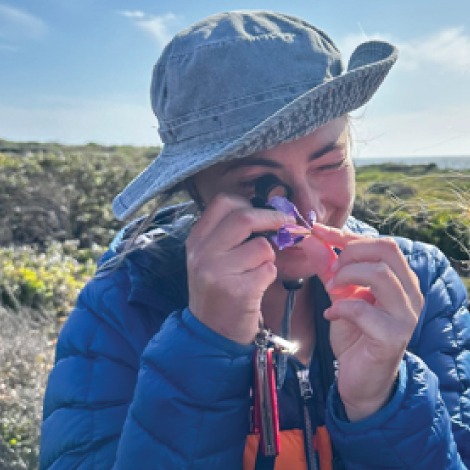Arcata, CA — The California Native Plant Society’s North Coast Chapter is proud to announce the recipients of its 2025 Student Research Grants. They awarded $12,000 between six emerging scientists from Cal Poly Humboldt whose work illuminates the ecological richness and botanical complexity of Northern California. These annual scholarships support graduate and undergraduate students conducting original research related to native plants and plant communities within the North Coast region.
“Our chapter is excited to support these young researchers in their ground-breaking work to answer important questions about our native flora.” Carol Ralph, Chapter President, explained.
“These students are not only conducting cutting-edge research,” said Gordon Leppig, a member of the CNPS Scholarship Committee, “they are also crafting stories of place, persistence, and adaptation. Their work helps us understand how plants evolve, survive, and sometimes vanish—knowledge we need to protect the ecological heritage of Northern California.”
Each grant supports fieldwork and research essentials, such as soil and water testing, DNA sequencing, ecological monitoring, and conservation modeling. In addition to funding, recipients are invited to share their findings with the broader CNPS community through newsletters and presentations.
The North Coast Chapter thanks all applicants for their contributions and commends this year’s recipients for their outstanding dedication to the study and preservation of native flora.
2025 CNPS North Coast Chapter Student Grant Recipients:

Olivia Moscowitz’s project addresses the conservation of Baker cypress, a rare fire-dependent conifer threatened by increasingly frequent wildfires. She will identify fire refugia and evaluate conditions for successful post-fire seedling establishment across its limited range. Through fieldwork, spatial modeling, and soil moisture analysis, she seeks to inform reforestation and adaptive fire management.

Annie Allen’s research examines how cattle grazing impacts fen and wet meadow ecosystems in the botanically rich Klamath Mountains Ecoregion. These rare peatland habitats are essential for biodiversity and carbon storage, yet remain understudied in the context of grazing. Allen will compare three fens with varying grazing histories by analyzing vegetation, soil pH, and water table depth. Findings will guide restoration efforts by clarifying grazing’s effects on fen health and informing management practices.

Zach Kinman is investigating whether Wyethia longicaulis, a rare serpentine-adapted plant, arose through budding speciation. His study integrates genetic, morphological, and ecological data to determine evolutionary divergence from its widespread relatives. By analyzing plant populations and their soil and climate contexts, he aims to illuminate speciation processes in the California Floristic Province. CNPS funding will support DNA extraction and serpentine soil testing beyond current NSF resources.

Anise Dellith-Moser is unraveling the evolutionary origin of Lupinus constancei, a critically endangered plant confined to Mount Lassic’s serpentine slopes. She will use genomic tools and ecological data to test for budding speciation and assess the species’ genetic diversity. This research will define conservation units and inform long-term management of this rare lupine. CNPS funding will support soil sampling critical to the project’s success.

Megan Joyce studies how restoration thinning in coast redwood forests affects wildfire behavior and post-fire recovery. Her fieldwork in Redwood National Park and Headwaters Forest Reserve examines fire severity, fuel dynamics, and forest regeneration. By modeling fire behavior and fuel accumulation, she aims to guide restoration strategies that balance ecological recovery with fire risk. Budget details are pending, and CNPS funding use is to be determined.

Heather Davis explores speciation within the Silene hookeri complex, endemic to Northern California’s serpentine soils. Using genomic sequencing, morphology, and soil data, she will test whether ecological divergence led to the evolution of narrowly distributed species like S. serpentinicola. Her work will clarify species boundaries and inform conservation in this biodiversity hotspot. CNPS support will fund essential soil analysis equipment.
